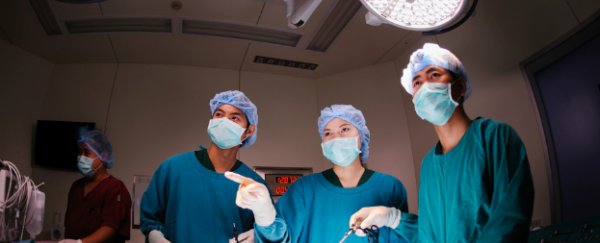A survey of more than 3 million patients who've been under anaesthetic in the UK and Ireland has provided new insight into the traumatic experiences of those who have woken up during surgery.
According to the research, led by Oxford University Hospitals in the UK, the phenomenon, known as "anaesthesia awareness" is relatively rare - roughly only one in 19,600 patients surveyed had woken up during surgery. This is lower than previous US studies, which suggested the rate was as high as one in 1,000 surgical patients.
But for lighter anaesthesia procedures, such as emergency C-sections, the risk is much higher - around one in 670 had experienced it. Anaesthesia awareness was also more common among patients who had received paralytics - substances that block the nerves from stimulating muscles - as part of their anaesthetic mix.
And, as you would expect, the experience was terrifying.
In the survey, patients who had woken up during surgery described experiencing a range of sensations, including choking, paralysis, pain, hallucinations, and near-death experiences.
The paralysis was reported to be the most distressing part of the event - more so than the pain - the study revealed.
"Paralysis is terrifying and has never been experienced by most people," Jaideep Pandit, a consultant anaesthetist who led the study, told CNN.
Nearly half of all the patients suffered long-term psychological consequences as a result of the anaesthesia awareness, including post traumatic stress disorder and depression.
But there is some good news. The research, which was published in the journal Anaesthesia in September, also showed that most people woke up before or after surgery, not during the procedure, contrary to popular belief (and some of the most frightening stories).
And most experiences were quite short-lived - three quarters of the experiences lasted under five minutes. Still, when you're awake on an operating table and unable to tell anyone, that can seem like an eternity.
One patient who knows how it feels is Carol Weihrer, a US resident, who woke up during eye surgery in 1998, and now suffers post traumatic stress disorder as a result.
"I was awake but paralysed," Weihrer told CNN. "I could hear the surgeon telling his trainee to 'cut deeper into the eye'."
"I was screaming, but no one could hear me. I felt no pain, just a tugging sensation. I tried to move my toes or even push myself off the operating table, but I couldn't move. I thought I was dying."
Since then she's had to sleep in a recliner to avoid the flashbacks of the operating table that come when she lies down.
This new study will now be used to help doctors prevent anaesthesia awareness, find new ways to identify which patients have woken up during surgery, and also develop better treatments for those who have gone through the frightening experience.
Daniel Cole, vice president of the American Society of Anaesthesiologists, told CNN that anaesthetic awareness occurs when an insufficient amount of anaesthesia is given to suppress human consciousness - such as during emergency C-sections, where too much anaesthetic can harm the baby, or trauma surgeries, during which high anaesthetic doses can push a patient over the edge.
However, the study shows that the biggest issue is when paralytics are used alongside anaesthetic, because patients who wake up can't tell doctors that they're aware.
Pandit is now recommending that nerve stimulators - which measure the extent of paralysis, should be used throughout surgery, in order to ensure that only the minimum amount of paralytics are used, so that patients can still move slightly if they wake up.
Education is also critical. "Patients who were told about awareness before surgery were prepared and not distressed when they experienced it," told CNN.
And if anaesthetic awareness does occur, the study shows that more needs to be done to help support patients.
"We can't dismiss the concerns of these patients. We need to offer immediate treatment to avoid long-term psychological harm," said Pandit.
While it's a pretty horrific thing to think about, talking more about the science behind waking up during surgery and the real chances of it occurring will help us find better ways to cope with the problem. After all, the only other alternative for many people is to undergo life-saving surgery without anaesthetic, which would undoubtedly be far more traumatic.
Source: CNN
